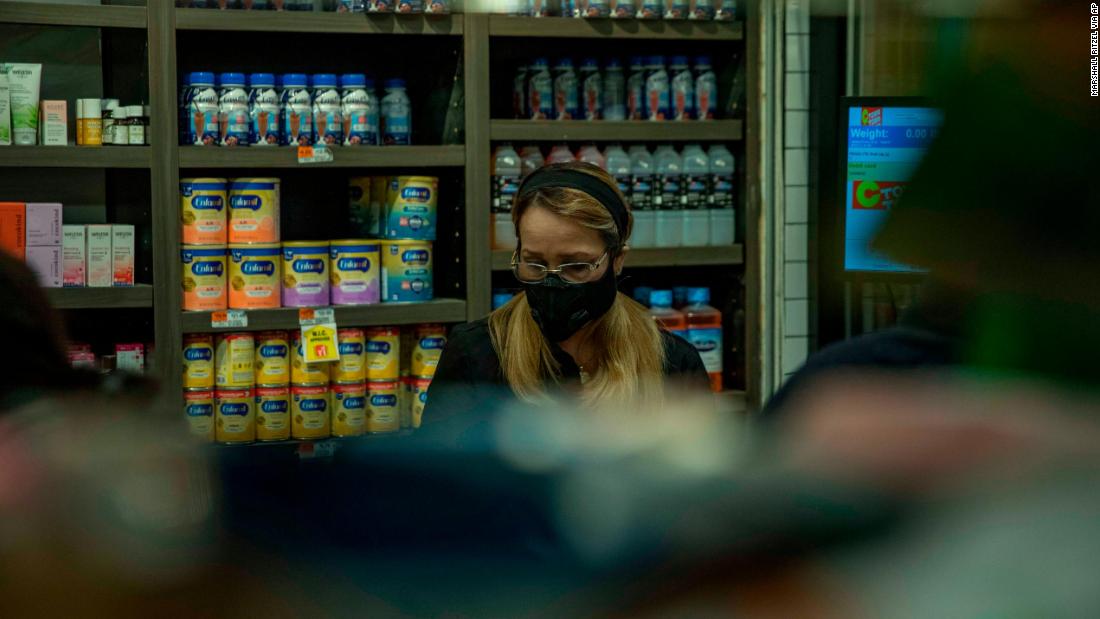Here’s how daily life could change as states consider modifying stay-at-home orders
As the United States combats the coronavirus pandemic, the timeline for reopening the country in a bid to jump start the economy remains unclear. But dramatic changes to daily life are coming into view — from mass temperature checks and mandatory use of face masks to empty sports and entertainment venues to Orwellian government monitoring of cellphone location and other personal information.
“You can call it the ‘new normal,'” said Juliette Kayyem, a CNN national security analyst and former assistant secretary in the Department of Homeland Security. “I call it the ‘now normal’ because I think every day is going to be different.”
Here’s how life could change as states consider modifying stay-at-home orders and other restrictions:
In California, like many other states that have virtually shut down, the reopening of schools is a priority.
“We need to get our kids back to school. I need to get my kids back to school,” California Gov. Gavin Newsom said with a chuckle on Tuesday.
It’s too soon to loosen restrictions on schools, Newsom said. When students do return to the classroom, likely in the fall, the educational environment will be dramatically different.
State officials are consulting unions and administrators about steps such as staggered school schedules,and changes to assemblies, physical education and recess. Increased sanitization efforts and deep cleaning will become standard in schools.
“We talk about what the new normal looks like. Normal it will not be,” Newsom said.
Floor plans conducive to physical distancing will be in place.
“The risk for a second wave comes in the fall when the kids get back in school,” said George Rutherford, an infectious disease expert at University of California San Francisco.
“You could have 9th and 10th grades come in the morning and 11th to 12th grades in the afternoon,” said Rutherford, who has worked with San Francisco health officials on the city’s response. “Or half of the students could come Monday, Wednesday and Friday. The other half on Tuesday, Thursday and Saturday.”
Disposable menus and masked servers
Restaurants will likely cut down the number of seats. Mask-wearing diners could be greeted by servers in masks and gloves with disposable menus in their hands.
New York Mayor Bill de Blasio told CNN, “Restaurants may have to be a lot less crowded to begin. We’ve got to take it slow.”
And restaurant goers could have their temperatures checked before sitting down.
Empty stadiums and concert halls
Barring a vaccine, a pharmaceutical intervention or herd immunity, Los Angeles Mayor Eric Garcetti said mass gatherings such as concerts and sporting events are unlikely until next year.
“The prospect of mass gatherings is negligible at best,” Newsom said this week.
New York Mayor Bill de Blasio said the return of such events could be far off.
“The last thing we should do is gather, you know, 10,000, 20,000, 50,000 people in one place,” he said. “That’s, like, the exact opposite of social distancing. We shouldn’t do that until we’re really sure that we’re out of this crisis.”
New York Gov. Andrew Cuomo told CNN Wednesday night that he had spoken with Mets owner Fred Wilpon.
“I said, ‘Why can’t we talk about a baseball season with nobody in the stands? Why can’t you play the game with the players?'” he said. “Look, it would be good for the country. It would be good for people to have something to watch and do to fight cabin fever. It’s something I’m going to pursue.”
But Major League Baseball would first have to strike deal with the players union.
“If you have no one in the stands then the numbers are going to change, the economics are going to change,” Cuomo said. “If Major League Baseball and the players can come to an agreement on how to adjust the economics for that reality … that would be a good thing.”
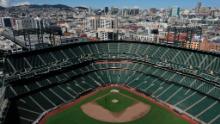
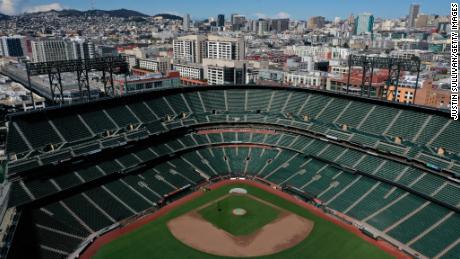
Oracle Park, home of the San Francisco Giants, may be empty for awhile.
“We want to get our sports back, so importantly,” Trump said at his coronavirus briefing Tuesday.
“I’m tired of watching baseball games that are 14 years old, but I haven’t had too much time to watch. I would say maybe I watch one batter and then get back to work.”
Intra-sqaud games, with some players in masks, have been played in empty stadiums in a country where spectators are known for dancing in the stands.
“There’s actually a picture from summer season of 1918,” Rutherford said, referring to the Spanish flu pandemic more than a century ago. “I think it was the Oakland Oaks, a Pacific Coast League team, and everybody’s wearing masks, including the umpire, the catcher and the batter.”
Still, baseball in the US may be some time away. Some players have even expressed a willingness to wear masks on the field.
Rutherford recalled a conversation with an A’s beat writer, who told him: “Have you ever been in a major league dugout after a game? It’s just disgusting. People spit everywhere. Ugh.”
Or imagine New Orleans without spring and summer festivals.
New Orleans Mayor LaToya Cantrell said she believes the city’s biggest events — French Quarter Festival, JazzFest and Essence Festival — will not happen until next year.
Tracking of location and other personal information
In China, authorities are using technology to track healthy people — and those who pose a risk.
To get into places such as restaurants, people need to show a green QR code.
Harvard’s Safra Center said people not in a “high-risk” population could move about freely. Their location on public transport could be tracked on “privacy-protective QR scanning.”
Jeffrey Shaman, a professor of environmental health sciences at Columbia University, said South Korea is using “very aggressive” contact tracing which looks into personal credit cards and phone records and car GPS information.
“The reality is your credit card company is already using this on you,” he said. “You signed it when you signed the contract that was in the fine print there, and they were using for whatever the heck they wanted to do with it to make money. And your phone is already using it. That’s what all the phone companies do, they track you. And lots of other apps on your phones do also.”
Changes at airports and limited travel
Monitoring of international travelers is being recommended by the American Enterprise Institute, which is also urging the public to limit unnecessary travel.
The Center for American Progress calls for nonessential travel to be prohibited outright during the stay-at-home phase: “State and local governments must use aggregated, anonymized cellular data to assess compliance with stay-at-home orders and determine whether targeted enforcement is necessary.”
Airline passengers should be required to have the contact tracing app, confirm no proximity to a positive case, and have a temperature check or show documentation of immunity, according to the liberal think tank.
Dr. Lee Riley, a professor and chair of the Division of Infectious Disease and Vaccinology at University of California, Berkeley, said, “People are discovering that a lot of business trips or small conferences can be actually done virtually. Travel as we’d known it, will definitely decrease, at least for the next two years.”
Beverage and snack distribution probably won’t change, except for the addition of alcohol wipes.
Subways, buses and transit stations should limit the number of passengers to 50% capacity, according to the Center for American Progress.
Face masks may become an everyday accessory
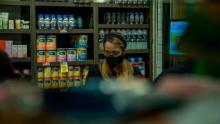
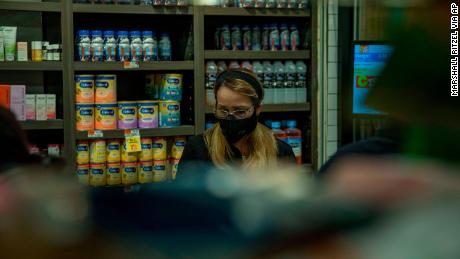
Get used to wearing face masks at the store.
There will be a three-day notice period before the order is enforced, allowing New Yorkers to secure masks or coverings. Cuomo said he was considering a civil penalty for those who break the rule.
During the initial phase of the reopening, people should be encouraged to wear nonmedical fabric masks in public, according to the American Enterprise Institute. Even people without symptoms.
“Face masks will be most effective at slowing the spread . . . if they are widely used, because they may help prevent people who are asymptomatically infected from transmitting the disease unknowingly,” the AEI said.
Ohio Gov. Mike DeWine told CNN that American life will be radically altered until a vaccine is developed.
“Things are just going to be different,” he said. “And that’s the sad truth.”
![]()


